Recently, the Emir of Kano was reported in the mainstream media to have suggested that state governments in Northern Nigeria should use mosques to provide education and help to quash the notion that there’s a difference between what some term as Islamic and western education, albeit in a temporary capacity.
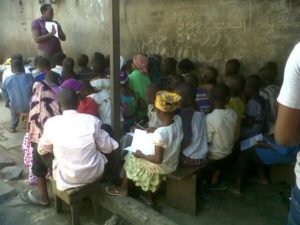
Whilst some people might question the Emir’s suggestion of using religious places for something that they consider as states’ secular provision, it is important to understand that in education accessibility is prerequisite to quality and without access to education in the first place, there wouldn’t be the issue of quality of education. However, the state governments will have to go into proper contracts with any religious organisation they decide to use their premises or assets for delivering education. The importance of this contract is to avert future disputes on the issue of overriding public interest (PDF).
I can still remember that as recent as some few years ago, a lot of churches and mosques served as school setups in various communities in Lagos state. Although, on a private basis and most of them were targeted towards families that were of similar faith beliefs to that of the religious organisations that provided the education to the children (I’m talking in past-tense here because I’ve not been to Lagos for some years now and I do not know the present practice). However, these religious organisations were able to provide the much needed fundamental aspect of education, that is, access to education. It doesn’t matter at certain levels in education if a child was educated under a mango tree or in an air conditioned classroom, what matters most is that learning takes place, and there are education methodologies that emphasise learning in natural environments (YouTube). For instance, Charlotte Mason and the Forest school (Wikipedia).
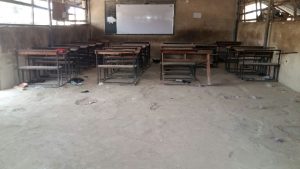
Going back to the issue of using mosques to provide education, the affected state governments need to understand and get a basic fact on provision of education right – that an emergency situation, demands an emergency provision and in education, time is of the essence, time is everything.
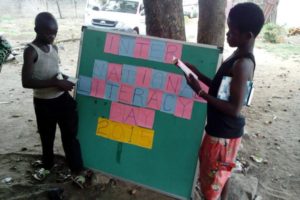
Instead of spending billions of Naira to build ultra-modern structures that will only accommodate tens of thousands of students at most, whilst hundreds of thousands of children will have no access to education; the affected state governments should spend such money on providing: training for teachers, ad hoc mass literacy programs, teaching and learning resources and free school meals.
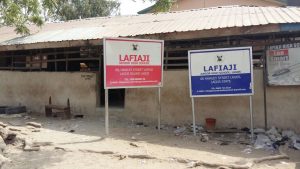
They should borrow from the education policy of the Lagos state government in the early 1980s (YouTube – between the 5th and 10th minute of the video), when the Lagos state government built – so called poultry sheds – to educate children and young adults in the state. Hence, significantly reducing the number of out-of-school children in the state and also bridged the education attainment gaps between children from disadvantaged backgrounds and those from better income households. The approach of the government also harmonised the education system in the state and communities were duly engaged and involved as major stakeholders in the whole process. Another significant feature of the Lagos state government approach was to site most of the schools in poor neighbourhoods and around market centres (this approach showed the government’s understanding of what an inclusive society and education should be like).
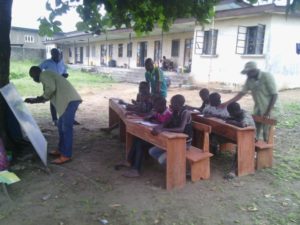
These state governments should explore the use of not only religious centres but they should also make use of open spaces, under trees, market places, farm settlements, abandoned buildings and playing fields; making use of ad hoc facilities and equipment like: tents, mats, chalkboards, benches, whiteboards, slates and radio sets. The need for this approach is because in order to provide immediate access to education to hard to reach children – who are mainly out-of-school children – governments will need to take education to them wherever they can be found, because to do this, is to fulfil one of the fundamental social and political duties and obligations of a government. And more importantly, having an educated society would significantly help in reducing future socio-economic problems within and amongst communities.
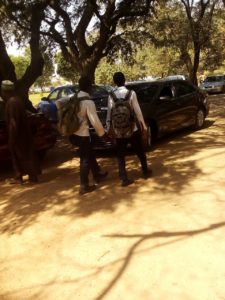
There’s no significant benefit that can be derived in spending billions of Naira on tens of thousands of students by these states whilst millions of children are out-of-school. Also, the states have to redefine their curriculum theory and practice and be more pragmatic. If the financial resources available to them to deliver education is good enough for mass literacy, then, they should stop fantasising on providing mass education and focus on providing quality literacy and numeracy skills education. And with support from other stakeholders like: NGOs, corporate organisations, community groups, religious organisations, individual volunteers – in these states, these governments will be able to go beyond providing the basics.
These governments need to pay attention to the issue of language of teaching, particularly, at the early stages between the ages of 3 and 8. There’s the need for them to create a robust and pragmatic approach towards the use of the local languages and English as media of teaching at these early stages. They need to realise that some of these children will hate school due to their inability to conceptualise ideas in a language that’s not native to them, they will need a gradual induction into the use of English language as the medium of teaching.
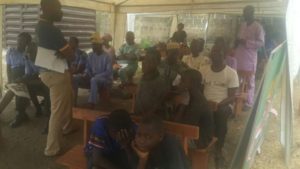
These states will need to create and have very robust community colleges, where adults can attend literacy and numeracy classes and take other relevant courses to aid the education of children and young people in their communities, and their individuals’ socioeconomic well-being.
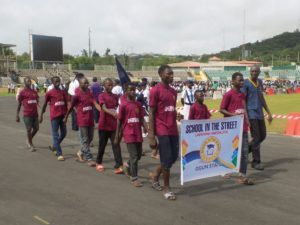
Finally, I would like to use this opportunity to call your attention to support organisations around you or elsewhere who are providing support to vulnerable individuals. In light of this, I am featuring the School in the Street (non-profit) project, founded by Kunle Sanni, who some years ago as a sociology major at Ogun state university in Nigeria had an aspiration to provide education to vulnerable children, and in order to fulfil this dream he decided to relocate from Lagos to Abeokuta.
As at the beginning of 2017, the SITS project has progressed from an organisation that was struggling to pay a monthly rent of Two thousand Naira (#2,000.00) to access an open space to provide education to homeless children and young adults in Abeokuta, to an organisation that is providing both literacy and vocational education to this group of learners, whilst at the same time providing other social services like reconnecting some of the learners with their families and reinstating them into the mainstream education system in the state. Please support SITS and other similar organisations. To donate to SITS, you can get in touch with the team on Twitter @schoolindstreet or on Facebook at schoolindstreet.
Please, leave your thoughts on this post in the comment section and feel free to share the article with your contacts. Thanks for taking out of your precious time to read my article/s!
If you like this post, kindly subscribe and/or follow me on Twitter @otukogbe and @EdusoundsNg or on Facebook at edusoundsng.
+1
But how easy would it be for govt to use mosque amidst cry of Islamization etc by CAN and others.
The fundamental issue is that the concerned state governments would have to engage with all the relevant stakeholders during the decision making process in an open and fair manner. Secondly, there should be clearly and well defined criteria for deciding the religious premises that would be considered for providing education under their stewardship. Also, adequate provisions must be made to cater for the needs of ‘minorities’ (not a word I’m comfortable with, but for the sake of clarity I’m using it) in these states and these could be informed based on ethnicity or religion for instance.
This is a very good idea, but what I think would be the most challenging thing is the issue of finance and proper management funds generated from volunteers, NGOs and the likes, further the government should have a monitoring team in place that would be a medium between the mosque committee and government so that the normal curriculum can be followed so that there would be no gap between these schools.
What is most important for the government to do is to have a detailed and well planned program. And with proper citizen engagement activities and sensitisation programs, I am convinced that the project will be successful. Also, I don’t think the state governments need money from volunteers or NGOs, what they need from such groups is their commitment in terms of advocacy, skills contribution and time; whilst the states facilitate the project and provide enabling environments for such groups to work successfully within the system.
If your suggestions here are taken seriously by the government not only in education but in other aspects of our lacks, we would develop in leaps. If the government really listens, we are not really asking for much. But they’d rather commission luxurious projects worth billions of Naira for the sake of embezzlement
Hopefully, things will improve in the nearest future. Thanks for reading my post/s.
I may need a clarification on the use of English in disseminating ideas to the young lads…
My submission has remained with the conviction that children are capable of comprehending a myriad of dialects at their early stages in life.
Why the restriction now?
Thanks.
Hi,
I’m not really clear about your views on “the use of English in disseminating ideas to the young lads…” and “that children are capable of comprehending a myriad of dialects at their early stages in life.
Why the restriction now?” Pls could you explain further the issues you’re trying to raise? Thanks
I only require a further explanation on why and how important is the use of English hinted on in the piece to be inculcated into the youngsters learning experience.
Kindly do this in line with the fact that, at tender age, children have potential to learn different languages…my thought anyway.